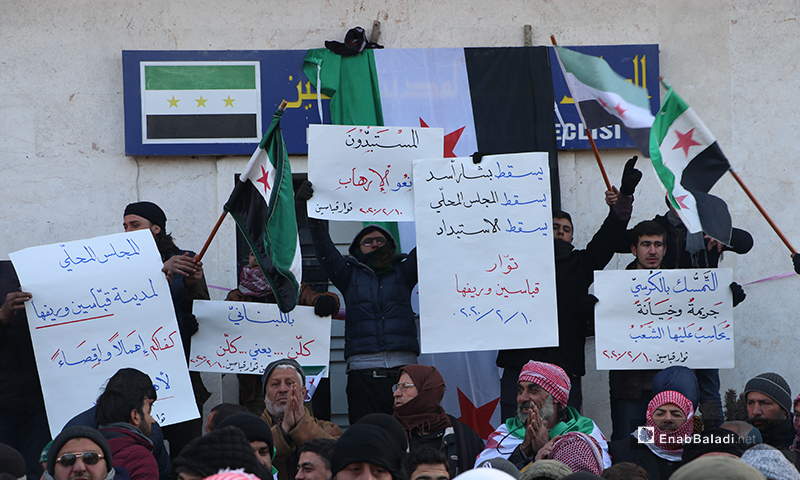Yasser al-Abdullah, a resident from the town of Qabasin in north-eastern Aleppo, took part in a peaceful sit-in to bring down the local council of Qabasin, on 10 and 14 February, along with several residents of Qabasin, including the forcibly displaced persons (IDPs).
The demonstrators raised slogans, stressing the importance of popular movement as a stepping stone for making the right decisions, and correcting courses in the area. Moreover, the demonstrators demanded the overthrow of the “autocratic” local council as the IDPs requested to be represented in the council.
Al-Abdullah and the townspeople promote only peaceful solutions to change the members of the council, alternate political power, and open the way for other experienced people. However, the members of the local council are “holding on to power” and rejecting any legislative change, al-Abdullah said to Enab Baladi.
Al-Abdullah believes that the reasons behind the demands of the protestors to change the local council of Qabasin are that the officials of the local council have assumed their posts for nearly three years, implementing “the most failed” projects in the area. Besides, “corruption and nepotism” continue to be widespread in the council, which he considered prevalent diseases; each member in the council began to hire his relative, irrespective of their experience and specialty.
Riyad Khalil al-Juma, a resident of Qabasin town and a demonstrator, told Enab Baladi that corruption is one of the essential reasons that prompted people to protest against the local council. Al-Juma pointed out that the members of the local council take the aid of the IDPs for themselves while the IDPs receive nothing.
Hassan, a displaced person from the city of al-Safirah to Qabasin town, appealed to the “rational people” to support the aggrieved citizens who “suffered” the injustices of the local council. Hassan thinks that the “tyrannical” members of the local board failed to fulfill their duties towards the IDPs in the rural areas near Qabasin.
The correspondent of Enab Baladi in rural Aleppo reported that with the advent of the demonstrations in the town, a committee of local dignitaries, clan elders, teachers, and university students wanted to conduct a series of negotiations with the members of the local council. However, the local council refused to sit at the negotiation table.
Direct contact between the negotiating committee and the members of the local council is absent. Some personalities attempted to intermediate between them. However, the officials of the local council are “clinging to power and refusing to give it up,” said Muhammad al-Obeid, a member of the negotiation committee to Enab Baladi, noting that council members were “staying at their homes and they don’t go out into town.”
Enab Baladi communicated with the head of the local council in Qabassin, Juma al-Issa, and with the council’s media office, who refused to make any statement, noting that they “work to resolve the issue.”
The local councils in rural Aleppo are civil administrations under Turkish supervision. They were established after the Syrian opposition factions took control of the most prominent cities in the region, including Jarablus, al-Bab, and Azaz in a military operation titled “Euphrates Shield.”
The Operation Euphrates Shield was a cross-border military operation conducted by the Turkish Armed Forces and Turkey-aligned Syrian opposition groups in August 2016 (the Syrian National Army).
The number of central-local councils in the region amounted to ten, distributed in the cities and towns of Azaz, Soran, Marea, Akhtarin, al-Bab, Bazaa, Qabasin, al-Rai, and Jarablus. In 2018, another Turkish-backed interim council was established in the city of Afrin.

